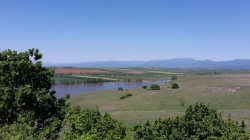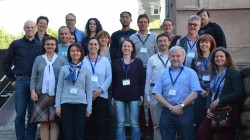press release, 03. May 2016
STACCATO: New research collaboration in Europe to work towards sustainable agriculture
The primary mission of the new BiodivERsA project "STACCATO" is to advance the long-term sustainable development of land use systems against risks of global change. The research initiative – coordinated by the Helmholtz Centre for Environmental Research (UFZ) – aims at quantifying the sensitivity of ecosystem functions and their subsequent ecosystem services to environmental pressures in representative agriculturally dominated landscapes in Europe.

Photo: UFZ / Anja Schmidt

Photo: Pensoft
In order to advance the sustainability in long-term development of agro-ecosystems STACCATO ("SusTainable AgriCultural ChAnge Through ecological engineering and Optimal use of natural resources") plans to quantify the sensitivity of ecosystem functions and the generated services to environmental pressures in representative agriculturally dominated landscapes in Europe.
The research consortium, combining the expertise of scientists from various fields of study from different European countries, will focus on investigating land use intensity at local as well as regional scale, the prevalent socio-economic backgrounds of farmers and stakeholders, and the potential impacts of future climate and land use change on biodiversity and the affiliated ecosystem functions and services.
During the kick-off meeting in Sofia, Bulgaria (20-22 April 2016) the scientists agreed on methodologies to be used for data acquisition in five pre-selected case study areas in Romania, Bulgaria, Germany, Switzerland and Sweden. . Landscapes will comprise annual crops, like winter wheat or oilseed rape, and semi-natural grasslands.
"In particular we intend to investigate the interactions between annual crops and the surrounding landscapes including the sprawling urban areas, and the potentials of ecological engineering as a tool for eco-functional intensification." explains the project coordinator Prof. Dr. Josef Settele, Helmholtz-Centre for Environmental Research - UFZ.
"The overall objective is the elaboration and testing of generally applicable principles within the frame of ecological engineering, and to contribute to the loss of valuable soil and land for agricultural productivity." he adds.
Ecological Engineering is an emerging discipline, concerned with design, monitoring and construction of agro-ecosystems in order to maximize ecosystem services through exploiting natural regulation mechanisms instead of suppressing them.
As a core output, STACCATO aims at developing guidelines for optimizing ecosystem functions and services provision and their stabilization under future climate and land use change. Therefore, STACCATO will analyze the potential of ecological engineering as a tool for eco-functional intensification.
STACCATO is a BiodivERsA funded EU project which will focus on the analysis and evaluation of Ecosystem Services (ESS), both in isolation and in concert, and their sensitivity to land use patterns in agriculturally dominated landscapes. The project receives funding within the BiodivERsA/FACCE initiative (agreement No BiodivERsA-FACCE2014-47).
Further information
Prof. Dr. Josef Settele
UFZ-Department Community Ecology
josef.settele@ufz.de
UFZ press office
Susanne Hufe
Phone: +49 341 235-1630
presse@ufz.de
In the Helmholtz Centre for Environmental Research (UFZ), scientists conduct research into the causes and consequences of far-reaching environmental changes. Their areas of study cover water resources, ecosystems of the future, environmental technologies and biotechnologies, the effects of chemicals in the environment, modelling and social-scientific issues. The UFZ employs more than 1,100 staff at its sites in Leipzig, Halle and Magdeburg. It is funded by the Federal Government, Saxony and Saxony-Anhalt.
www.ufz.deThe Helmholtz Association contributes to solving major challenges facing society, science and the economy with top scientific achievements in six research fields: Energy; Earth and Environment; Health; Key Technologies; Matter; and Aeronautics, Space and Transport. With some 39,000 employees in 19 research centres, the Helmholtz Association is Germany’s largest scientific organisation.
www.helmholtz.de